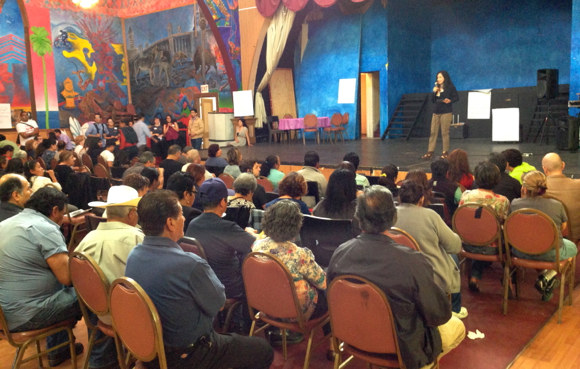
Hugged between Fourth and Sixth Streets and in the middle of a residential area, La Casa del Mexicano has been neglected for years, and it's continued existence was in doubt only a few years ago. But on Wednesday, more than 80 community members inside La Casa del Mexicano shared their ideas on what the iconic space could become.
La Casa was most recently an events hall, hosting concerts, parties and even lucha libre matches. Residents at thursday meeting were calling for La Casa to become an all-purpose community center, complete with technology training, job services, and activities for youth and families.
Hosted by East Los Angeles Community Corporation, the local non-profit affordable housing developer, the task to revitalize the space officially fell on ELACC in January. Staff at ELACC estimated the cost to rehabilitate La Casa as high as $5 million, said ELACC president Maria Cabildo in an interview.
After a lengthy process that reached as high as the California Attorney General, the rights to La Casa were handed over to ELACC along with the debt incurred from the previous owner. Mexican Benefit Corp., the previous owner, took out a loan of $165,000 in 2006 and failed to repay it leading to the foreclosure of La Casa, said Cabildo. Not content to let the space languish, activists took complaints to city officials and even got the attention of the state attorney general Kamala Harris.
This is ELACC's first venture outside of creating affordable housing. Known for its preservation efforts from its work at the Boyle Hotel, La Casa del Mexicano provides a difficult challenge to create revenue out of a community center, said Cabildo.
Of the roughly 80 people that attended Wednesday's event, more than 30 youth from i.am.angel foundation shared their ideas. Danny Perez, 21-year-old Boyle Heights resident, said that he wanted to see a music program at La Casa.
While the roof looks like it was fixed recently, the broken windows still can't rain from entering the building.
Built in 1904, and established La Casa del Mexicano in 1931, La Casa has a long history of helping the Mexican community, including providing english learning services to the neighborhood.





